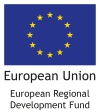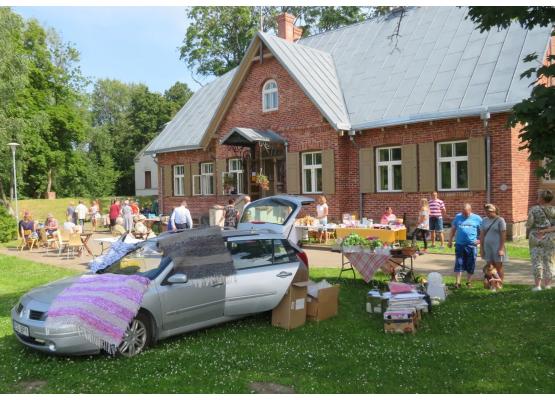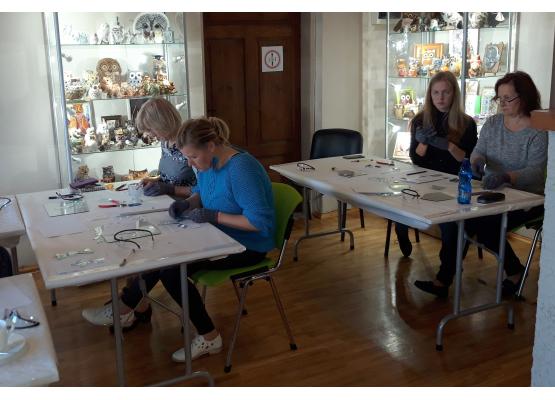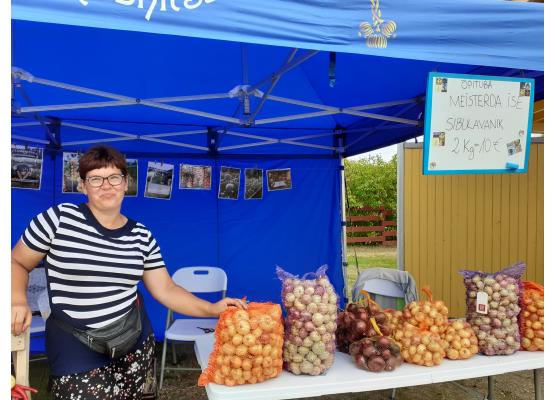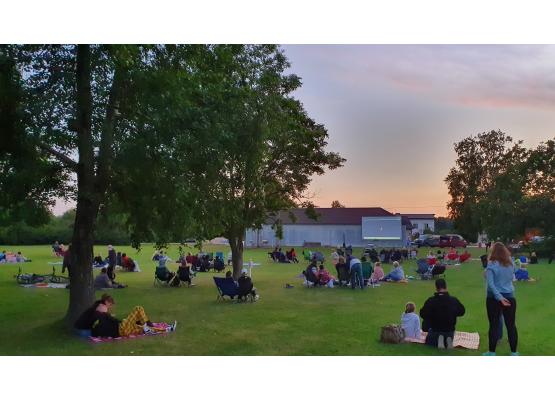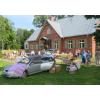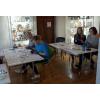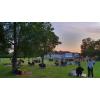In English
Designing community services within international project
Project Act Local is nearing completion of its activities. One week before the project final event, it is appropriate to ask the project coordinator Silja Lehtpuu some questions to better understand how the project was delivered, how the global COVID-19 crisis affected this international project and what are the biggest achievements of the project.
How would you introduce the Act Local project in a few sentences?
As a result of the project, community services will be developed for 15 rural communities and local NGO's, which will enable them to earn income and thus provide employment opportunities for local people. The services are targeted towards locals and visitors of the area. The opportunity to work in home villages allows local people to increase their incomes and thus improve their quality of life.
What are the biggest achievements of this project?
The partners managed to involve 19 NGO's in the project activities right at the beginning of the project. As many as 16 village societies were ready to contribute more and start providing community services. In the meantime, the COVID-19 pandemic has made the implementation of project activities much more difficult, but 15 village communities have managed to start providing community services.
What community services have been launched within the project?
In Estonia, a cultural festival "Uusvada Dada" and programs for visitors have been established in Uusvada village. Other established community services in Setomaa municipality have been tourism service with a guide, workshops and catering in Lüübnitsa village, market place and market days were organized in Matsuri village, Saatse village organized local events like Sõirapäev, Päätnitsa pidu, Päätnitsapäiva fair and they also designed food souvenirs.
Another municipality from Estonia that took part in the project was Alutaguse municipality. A community café and a traditional food service were established in the small town of Iisaku, and fair days of local products took place in the village of Illuka. A summer café service was established in Alajõe village and a theater program primarily for groups of children “Muinasjutuküla” was developed in Kiikla village.
In Latvia, the atmosphere of events in Ape municipality has been designed, activities and workshops have been organized for visitors, and a recording studio has been established. In Engure municipality, the project included an outdoor cinema, workshops, as well as beach volleyball and other sporting events.
The aim of the project is to create new job opportunities in rural areas. This is a very necessary but also a very difficult task. Has this project already created new jobs?
The first season of service testing coincided with the COVID-19 pandemic in 2020, and therefore only a very limited number of services could be launched and no jobs were created. Testing of the services will continue in the spring and summer of 2021. The first part-time jobs are expected to be seen in the autumn.
How did you find suitable project partners? What do you have in common?
The partners involved in the project from Estonia and Latvia (Setomaa Parish, Alutaguse Parish, Ape Parish, Engure Parish) are located in a fairly large area in rural areas with many villages where local people are willing to contribute to the development of their homeland and create new jobs through community services. Both Estonia and Latvia have undergone administrative reform, as a result of which local governments have become larger. New municipalities with larger territories are looking for new initiatives and opportunities to support local people living in rural areas who, for various reasons, are unable to work in larger centers on a daily basis. Therefore, the common interest of local governments is involved in supporting and activating village communities in creating community services.
Setomaa Parish, Ape Parish and Engure Parish have also previously cooperated in the implementation of various projects.
Why did you decide to write the project specifically for the Central Baltic Programme and why did you decide to approach the problem through an international project?
The common interest of the local governments involved was to support and activate rural village communities with the aim of creating jobs. Joining forces enabled the project partners to use the good experience of both countries in developing community services. In this way, it was possible to jointly develop and use the best possible methodology and learn from each other's experiences in order to design services for the participating village communities in both countries. The corresponding priority of the Central Baltic programme fit in very well with our idea. There was also a positive experience in the past with the Central Baltic Programme.
How was your experience of participating in an international project during the COVID-19 crisis? Did it become an obstacle in any way?
The corona crisis has made it very difficult to launch community services in particular, as the target groups of the services are largely tourists and tourist groups, and there were few such visitors in 2020. At the same time, the launch of some services was less affected. Most community-based activities (trainings, study trips) require participants to meet and interact with each other. As a result, the project activities had to be changed and some activities even had to be abandoned (study trip to Latvia, part of practical training). Of course, it is possible to organize online trainings, but they are still effective only in transferring theoretical knowledge. Also, the festive closing event, which was supposed to be the highlight of our project and bring together the communities of all 4 regions, will unfortunately take place virtually.
Eesti keeles
Kogukonnateenuste loomine rahvusvahelises projektis
Projekt Act Local on oma tegevustega lähenemas lõpule. Nädal enne projekti kokkuvõtvat üritust on sobilik projekti koordinaatorilt Silja Lehtpuult küsida mõned küsimused, et paremini mõista, millega projekti raames täpsemalt toimetati, kuidas ülemaailme koroonakriis rahvusvahelise projekti käekäiku mõjutas ning mis on projekti suurimad saavutused.
Kuidas tutvustaksid Act Local projekti mõne lausega?
Projekti tulemusena arendatakse välja kogukonnateenused viieteistkümnele külakogukonnale/külaseltsile, mis võimaldab teenida külaseltsile tulu ja läbi selle pakkuda töövõimalusi kohalikele inimestele. Teenused on suunatud piirkonna külastajatele ja kohalikele elanikele. Töökoha võimalus kodukülades võimaldab kohalikel inimestel oma sissetulekuid suurendada ja seeläbi oma elukvaliteeti parandada.
Millised on suurimad saavutused, mis selle projekti raames on suudetud korda saata?
Partneritel õnnestus projekti tegevustesse kohe projekti alguses kaasata 19 külaseltsi. Tervelt 16 külaseltsi olid valmis panustama rohkem ning alustama ka kogukonna teenuste osutamisega. Vahepeal puhkenud COVID-19 pandeemia on projekti tegevuste elluviimist tunduvalt raskendanud, kuid 15 külaseltsi on siiski suutnud kogukonna teenuste osutamisega alustada.
Missugused kogukonnateenused on projekti raames käima pandud?
Eestis on Setomaa vallas Uusvada külas projekti algatusel loodud kultuurifestival „Uusvada Dada“ ja programmid külastajatele, Lüübnitsa külas turismiteenus giidi, töötubade ja toitlustusega, Matsuri külas loodi kohalike toodete müümiseks turuplats ning korraldati turupäevasid ja Saatse külas korraldati Sõirapäeva ja Päätnitsa pidu, Päätnitsapäiva laat ning valmistati toidusuveniire.
Teine vald Eestist, kes projektis kaasa lõi, oli Alutaguse vald. Sealses Iisaku alevikus loodi kogukonnakohvik ja pärimustoidu teenus, Illuka külas toimusid kohalike toodete laadapäevad. Alajõe külas loodi suvekohviku teenus ning Kiikla külas elamusteenus „Muinasjutuküla“- teatriprogramm eelkõige lastegruppidele.
Lätis on Ape vallas kujundatud ürituste atmosfääri, korraldatud tegevusi ja töötubasid külastajatele ning loodi salvestusstuudio. Engure vallas pandi projekti raames käima välikino, kunstitöökojad ja õpitoad ning korraldati rannavõrkpalli ja teisi spordiüritusi.
Projekti eesmärgiks on uute töövõimaluste tekitamine maapiirkonda. Tegemist on väga vajaliku, aga ka päris keerulise ülesandega. Kas selle projekti tulemusena on juba tekkinud uusi töökohti?
Esimene teenuste katsetamise hooaeg sattus 2020. aastal aset leidnud COVID-19 pandeemia ajale ning seetõttu oli teenuste käivitamine võimalik vaid väga piiratud mahus ja töökohti veel ei tekkinud. Teenuste katsetamine jätkub 2021. aasta kevadsuvel. Sügiseks loodetakse näha esimesi osalise tööajaga tekkinud töökohti.
Kuidas leidsite sobivad projektipartnerid? Mis teil on ühist?
Projektiga seotud partnerid Eestist ja Lätist (Setomaa vald, Alutaguse vald, Ape vald, Engure vald) asuvad üsna suurel territooriumil maapiirkondades, kus on palju külasid, mille kohalikud inimesed on valmis panustama oma kodukandi arengusse ja looma kogukonnateenuste kaudu endale uusi töökohti. Nii Eesti kui ka Lätis on toimunud haldusreform, mille tulemusel on omavalitsused muutunud suuremateks. Uued suuremate territooriumidega vallad otsivad uusi algatusi ja võimalusi, et toetada maakülades elavaid kohalikke inimesi, kes erinevatel põhjustel ei saa igapäevaselt suurematesse keskustesse tööle minna. Seetõttu on kaasatud kohalike omavalitsuste ühine huvi toetada ja aktiveerida külakogukondi kogukonnateenuste loomisel.
Setomaa vald, Ape vald ja Engure vald on ka varem teinud koostööd erinevate projektide elluviimisel.
Miks otsustasite projekti kirjutada justnimelt Kesk-Läänemere programmi? Miks otsustasite probleemile läheneda rahvusvahelise projekti kaudu?
Kaasatud kohalike omavalitsuste ühine huvi oli toetada ja aktiveerida maapiirkondade külakogukondi töökohtade loomise eesmärgiga. Jõudude ühendamine võimaldas projekti partneritel kasutada mõlema riigi häid kogemusi kogukonnateenuste kujundamisel. Nii oli võimalik välja töötada ja kasutada ühiselt parimat võimalikku metoodikat ning õppida üksteise kogemustest mõlema riigi osalevatele külakogukondadele teenuste kujundamiseks. Kesk-Läänemere programmi vastav prioriteet sobis meie ideega väga hästi. Samuti oli varem positiivne kogemus koostöös Kesk-Läänemere programmiga.
Kuidas oli teie kogemus koroonakriisi ajal rahvusvahelises projektis osaleda? Kas see sai mingis osas ka takistuseks?
Koroonakriis on tugevalt raskendanud eelkõige kogukonnateenuste käivitamist, sest teenuste sihtrühmad on suures osas turistid ja turismigrupid ning selliseid külastajaid liikus 2020.aastal vähe. Samas osa teenuste käivitamist mõjutas see vähem. Suurem osa kogukondadele suunatud tegevusi (koolitused, õppereisid) eeldavad osalejate kokku saamist ja omavahelist suhtlemist. Sellest tulenevalt tuli projekti tegevusi ka muuta ning mõnest tegevusest isegi loobuda (Läti õppereis, osa praktilisi koolitusi). Loomulikult on võimalik korraldada veebikoolitusi, kuid need on siiski efektiivsed ainult teoreetiliste teadmiste edastamisel. Samuti pidulik lõpuüritus, mis pidi olema meie projekti tähtsündmus ja tooma kokku kõigi 4 piirkonna kogukonnad, toimub paraku virtuaalselt.


